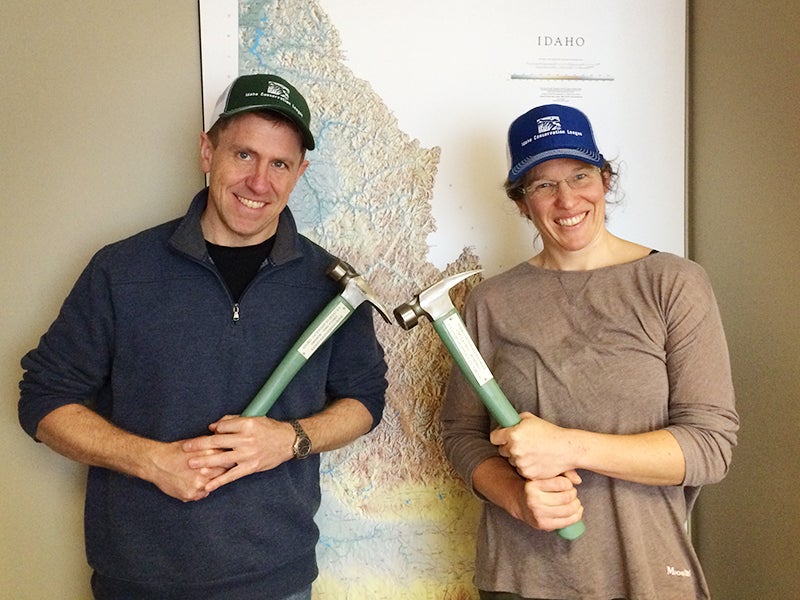Committing to Clean Up Their Own Messes
America’s dirtiest industrial polluters will now be legally accountable for paying for their clean-ups thanks to the EPA’s financial assurance rules.

This page was published 9 years ago. Find the latest on Earthjustice’s work.
For decades, communities across the nation have been exposed to toxic waste due to irresponsible industrial management of toxic chemicals. The so-called “Superfund” law of 1980 was enacted to ensure there would be money in place to clean up these industrial messes, but funding often ran dry, leaving the burden of clean-up on the shoulders of taxpayers. A recent victory by Earthjustice, on behalf of several conservation groups, will force the EPA to create tough new rules that require companies to post “financial assurances” to show that they have the cash to clean up their messes after they’re done operating.
Earthjustice recently had the honor of speaking with Justin Hayes, program director for the Idaho Conservation League. The league was one of six groups that sued the EPA for failing to finalize financial assurance rules until now. In March the league gave Earthjustice attorneys Amanda Goodin, Lisa Evans and Jan Hasselman its “Green Hammer” award for outstanding work on the legal case.
Niria Garcia: Why do we need “financial assurance” rules?
Justin Hayes: These rules ensure that people act responsibly, that industries make good on their commitments to clean up their messes and that they try to avoid making them in the first place. In the event that companies don’t live up to their part of the bargain, at least the funding is available so that we can make sure that environmental contamination is removed and communities are protected.
NG: Can you give me a real-life example of how “financial assurances” would work?
JH: Imagine that it’s a mine we are talking about. If the mining company was going to build a big cyanide leaching processing facility to extract the gold and they didn’t have to place money aside to be financially prepared for the clean-up, then maybe they wouldn’t operate it as cleanly.
They would know that they couldn’t really be held accountable and when they were done they could just leave the site for someone else to clean up. But if there’s a big bond out there, they probably would like to get that bond back.
NG: There are sites in Idaho where polluters have fallen down on the job in terms of helping to pay for their clean up. Could you tell us about one of those places?
JH: Idaho has had a long history of mining. Companies come to our state, open their mines, take what they want and then leave, and sometimes they leave a big mess.
Down by Boise we’re struggling with a gold mine called the Atlanta Gold mine. Their old mine tailings and mine works discharge arsenic contaminated water into the Boise River. There’s only a $30,000 bond in place for that mine because the U.S. Forest Service, when they permitted it, didn’t think it would be a problem, couldn’t imagine that there would be a mess and couldn’t imagine that the company wouldn’t stick around to clean it up. But Atlanta Gold hasn’t cleaned it up—they are teetering on the verge of bankruptcy, their stock is just worth pennies per share, and because no bond was put in place that was of a meaningful amount, there is very little likelihood that the site will be cleaned up.
NG: How did Earthjustice help contribute to this victory, and why did you decide to award our attorneys the “Green Hammer?”
JH: Earthjustice attorneys made this case possible. They helped develop the case, they worked with my organization and all of the other organizations that were a part of this so that we could put the facts together, put a good argument forward, and then the Earthjustice attorneys carried it across the finish line in court.
It was a very hard case; it was many years of very strong efforts from lots of Earthjustice attorneys, and when we see someone put that kind of effort into something that is so important to us, we want to make sure that they know how much we appreciate it.
NG: Do you think the job is finished?
JH: The job is never finished. We are seeing an effort in Congress right now to put riders in to keep these changes from coming into effect, so we have to be vigilant. We need to participate in the rulemaking and we need to make sure that stuff actually gets finalized. This court victory was tremendous, but it isn’t the end. There’s a lot of follow-through.
NG: Are there more steps we need to take to protect the public and the environment from hazardous waste?
JH: There’s an opportunity to think about reengineering processes to eliminate the potential for these messes, and there’s also the opportunity to think about, ‘Okay, if you’ve got this mess how do we contain it and clean it up?’ I think that the requirement for financial assurances is going to affect both sides of that because companies are not going to want to have to put too much money in a bond. If they reengineer processes with an eye toward reducing risk and reducing the potential for a future mess, that means that their bonds can be smaller up front. That’s going to put a lot of pressure on the industry to make sure that they are proposing the least risky and best alternative.
Established in 1987, Earthjustice's Northwest Regional Office has been at the forefront of many of the most significant legal decisions safeguarding the Pacific Northwest’s imperiled species, ancient forests, and waterways.